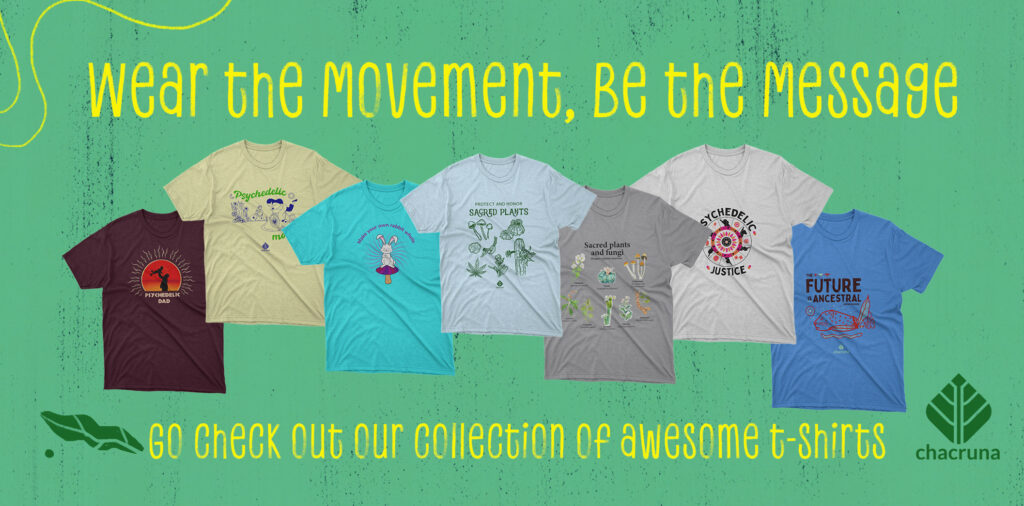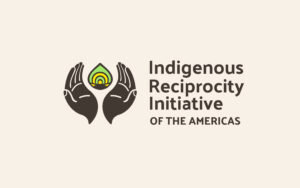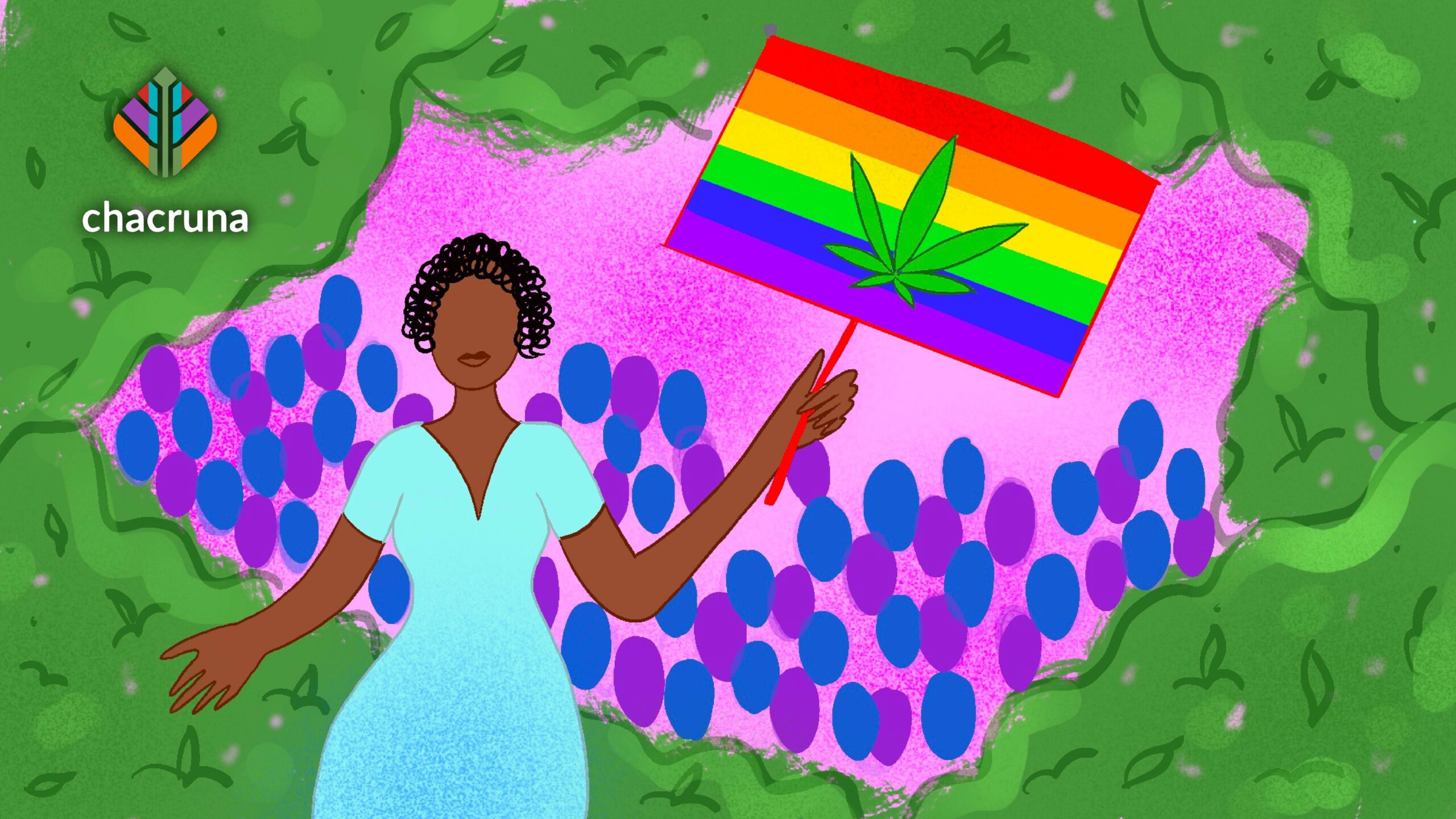- Press Release – Cultivate Roots for Cultural Change with Chacruna: Psychedelic Culture 2024 Tickets Now On Sale - April 15, 2024
- Amber Senter on Queer Black Spaces in Cannabis Entrepreneurship, Disco Joints, and the Importance of a Patient-First Approach - February 27, 2024
- On Equity-First Models for Psychedelic Healing - November 10, 2023
Ali McGhee: Can you tell me a bit about you and your background?
Amber Senter: I’m a Veteran of the United States Coast Guard. I’m a queer Black woman. I have a cannabis business where we do supply chain management in cannabis, but build inclusive supply chains – working intentionally with small, Black-owned, queer-owned, women-owned businesses and uplifting folks throughout the supply chain by telling stories about their products.
I’m the Cofounder and Executive Director of Supernova Women, which creates opportunities for Black and brown folks in cannabis, and I’m the architect of one of the first social equity programs for cannabis in the United States, which I have helped establish throughout the country. I also helped Senator Steven Bradford establish Senate Bill 1294 – the California Cannabis Equity Act of 2018, which established a fund for all local social equity programs throughout the state of California.
All my work has really been to lower barriers of entry for Black and brown folks in cannabis, and to help give opportunities to folks in underserved communities in the industry. I worked with Decriminalize Nature Oakland to help decriminalize entheogenic plants here in Oakland and was one of the organization’s founding Advisory Board members. I’m constantly working to create opportunities for folks.
All my work has really been to lower barriers of entry for Black and brown folks in cannabis, and to help give opportunities to folks in underserved communities in the industry.
I’m also a medical patient, not just of cannabis but all natural plant medicines. And because of my experiences as a patient, my advocacy is going to be shifting a bit moving forward. I’ll be more focused on creating access for patients, particularly those in underserved communities because a lot of us rely on not just Western medicine. Western medicine is necessary, but there needs to be a bridge, or a way to merge both natural plant medicines and Western medicine. A lot of those channels have been disconnected, especially as cannabis was legalized. People can’t afford the cannabis they were buying before, and a lot of products made for medical patients aren’t being made anymore. Moving forward, I’m still figuring out how I can bridge the gap between Black and brown people and small cannabis companies. That bridge between the industry and the patients seems to have been lost through legalization. I look at Proposition 215, and in those days (1996-2018) there was such a thriving, strong industry all because of patients. That has suffered since patients have been left behind. I’m thinking about how to bring them back into the forefront of the conversation and get back to where we were before.
Where I’m at and this health journey I’ve gone through has played a pivotal role in my advocacy. I think that will be amplified moving forward, given that my health challenges have become so significant. I found out in May that I need a lung transplant. That started to get my gears turning: How can I as a patient help to amplify and shine a light on where we were versus where we are now, and how can we get to a more sustainable place for patients, considering cannabis is medicine and it’s not really being treated the way it was such a short time ago. I am definitely a medical patient first, an advocate second, and a business owner third.

Shop our Collection of Psychedelic T-Shirts.
AM: How did you get interested in psychedelics, and in cannabis specifically?
AS: Through medical use. I first started smoking cannabis because I saw how it helped. Particularly as a teenager, I had a lot of nausea, and cannabis completely got rid of that whole issue altogether, which I thought was incredible. As I got older I started to use it a bit more intentionally, and I started noticing that really high-quality cannabis was the most effective for my needs. Then I started growing my own. That’s how I really got into the industry, around 2005.
AM: You have noted in many publications that there is a major diversity problem in psychedelic business and entrepreneurship, specifically for Black and brown business owners. What is happening now that is challenging, or exciting? Have you seen any changes in the ethnic and racial diversity in the last few years?
AS: Capital requirements are the problem holding small businesses – in particular, Black and brown and underrepresented business owners – behind. Capital challenges are ridiculous due to taxes and regulation, whether that’s for cannabis, or for psilocybin in places like Oregon.
I’m on the advisory board for the state of Oregon’s psilocybin regulatory agency, specifically the Equity subcommittee. We got to see a lot of legislation as it was being proposed, before it was adopted into law. And legislators don’t want to recreate the wheel. They want to cut and paste. They were cutting and pasting from cannabis legislation, but there are a lot of broken laws perpetuating the problem that is already happening. Cannabis is overregulated. Overregulation and overcompliance jump up the cost of production, and affect who will be able to actually make these products. Meanwhile, the cost of the product is plummeting because there is more access, which is what we want – but if we want people to get into these industries and make a sustainable living for themselves and their communities, we have to figure out how to do that without robbing people.
The industry is tough right now, and cannabis is tough because the cost of doing business is so high.
The industry is tough right now, and cannabis is tough because the cost of doing business is so high. That is unfortunate. We do have 24 states that have legalized cannabis at this point. We are coming up on a tipping point of over half, which means the federal government will have to take more steps forward. Public opinion has clearly changed and people want people to stop going to jail for weed.
Those are good things. This is much more widely accepted and normalized, which is what we want so that folks can have access everywhere.
AM: How has it been to be a Black American woman in cannabis entrepreneurship?
AS: Stressful. Not only because of my identity and who I am as a person, but also all the perils of the industry. We’re dealing with all of this, the world as it is and these unnecessary, burdensome things within the industry: overtaxation, overregulation, not enough access for patients, the plummeting cost of cannabis. It’s a race to the bottom, but taxes are also increasing. It’s been very challenging. And then being a queer Black woman and having bias against you because of who you are creates a special set of challenges in getting product on shelves. It’s also about having to be a part of good old boy networks and penetrating barriers and opening doors.
That’s just selling the product. It’s not even getting investment for the business. Investors like to invest in people that remind them of themselves. How many queer Black women are investors? Not many. Of all the venture capital, .006% goes to Black women. I don’t know the statistics for queer Black women. The chips are very stacked against people that look like me and identify as I do.
Find more information on the upcoming Psychedelic Culture Conference.
AM: You are truly in the advocacy space, working and presenting to local governments. The City of Oakland’s Equity Program and SAFE are some initiatives to try to create more diversity within the cannabis industry, though they may or may not center equity as well. Is anyone doing it right? What changes need to be made?
AS: There are a lot of nonprofit organizations putting out white papers and guides on things to be considered for creating a sustainable industry. Supernova put out a Social Equity Impact Report in 2022 on the return on investment and what potentially could lead to the biggest and best social outcomes for the community in an ideal social equity program, and what those components should include. That was a really cool report. We are publishing another one looking at the federal level in the summer of 2024.
The Parabola Center out of Massachusetts has been putting out really great white papers on how both small and big businesses can have their places in the regulated cannabis industry and what that looks like, including how to make sure the industry doesn’t become monopolized, how to create sustainable industry for small businesses, as has the Cannabis Regulators of Color Coalition. There are a lot of guides out there on how to create a sustainable industry.
What gives me hope is speaking up and then getting results; speaking up and then building up momentum and a movement.
What gives me hope is speaking up and then getting results; speaking up and then building up momentum and a movement. Being able to really rally a city and a cannabis community together to get the equity program passed in Oakland was a huge deal, and it sparked a whole conversation. That gives me hope we are so small but so mighty. We have such big big voices and people listen.
It’s really all about putting the marginalized people at the front. We are going to be able to create more access to cannabis through the patients.
AM: Are you working on any publications or public appearances now that you’d like to share about?
AS: Our 2024 report will be pretty expansive. That will be published this summer. That’s really the biggest thing I can speak to right now. Over the next three months, we’ll be putting out white papers on topics like patient access and others.
AM: You are a true visionary entrepreneur! Can you tell me about MAKR House, and the brands that are part of it, like Landrace Origins?
AS: I’m the CEO of MAKR House, which is a house of brands, on the supply chain management side of things. We make a couple of cannabis products, Disco J’s sparkly infused pre-roll, which has sparkles on the outside. It’s a disco joint inspired by queer people, a brand to highlight queer Black and brown people and people of color. Disco was born out of Black and brown people and queer people congregating to be themselves, creating space. So I would hope that a sparkly disco joint would add to that atmosphere of queer folks having a great time getting together and smoking some weed.
We are launching a cannabis cigar, Tiger’s Eye – inspired by the Black exploitation and Black culture of the ‘70s. It’s a nod to my parents. I had some pretty fly parents. Black culture is the most mimicked culture in the world, and we’re such a small subset of people. We only make up 13% of the population in the United States. That is tiny considering the global impact we’ve had, and I really want to honor what we’ve done through this brand.
Landrace Origins is so much fun. It’s coffee and cannabis pairing with monthly coffee and cannabis events. It’s been a fun brand to build. People try all of our coffees and teas and smoke weed. We have vendors, listen to music, and have a great time. We also sell coffee on the website and in person and are working on scaling. My cousin roasts all of our coffee in L.A. We source flour from primarily women-owned and Black and brown owned farms from Northern California.
I’ve really enjoyed the human aspect, incorporating people from the farms and telling their stories on the coffee and cannabis sides. I learned a ton about supply chain management through the coffee. We have a special relationship with a women-owned coffee farm in Democratic Republic of Congo. Through Supernova, we are building up women and teaching them entrepreneurship. We used funds from coffee sales to build infrastructure in the village, including a community and women’s health center, a maternity center, and support schools. When we work really intentionally through the supply chain, making sure our dollars are spent working with partners where it’s really impactful, we get to vote with our dollar as small business owners, and we want to make sure it really really counts. What’s happening in the DRC is interesting. They’ve been oppressed people for decades, currently specifically with cobalt. But that happens with coffee as well. The land is so rich in resources and is constantly being extracted. I’m glad we actually get to work with people in an ethical way and pay them what they’re worth, and help to build – or rebuild – what it’s supposed to be in the Congo. That’s LandRace.
AM: How can white people be good allies to people of color working in this space?
If we ask you to amplify something, please do it.
AS: It’s really just through helping us through whatever your resources are. If you own a shop, put some products from Black and brown folks on your shelves. If you’re a consumer, ask for the products at the dispensary. That’s really helpful and impactful and buyers listen. If you’re an investor, invest. Or if you don’t make an investment, open up your network, make introductions, try to be helpful, and advocate on our behalf. If we ask you to amplify something, please do it.

Discover the Indigenous Reciprocity Initiative of the Americas
Take a minute to browse our stock:
Did you enjoy reading this article?
Please support Chacruna's work by donating to us. We are an independent organization and we offer free education and advocacy for psychedelic plant medicines. We are a team of dedicated volunteers!
Can you help Chacruna advance cultural understanding around these substances?


















